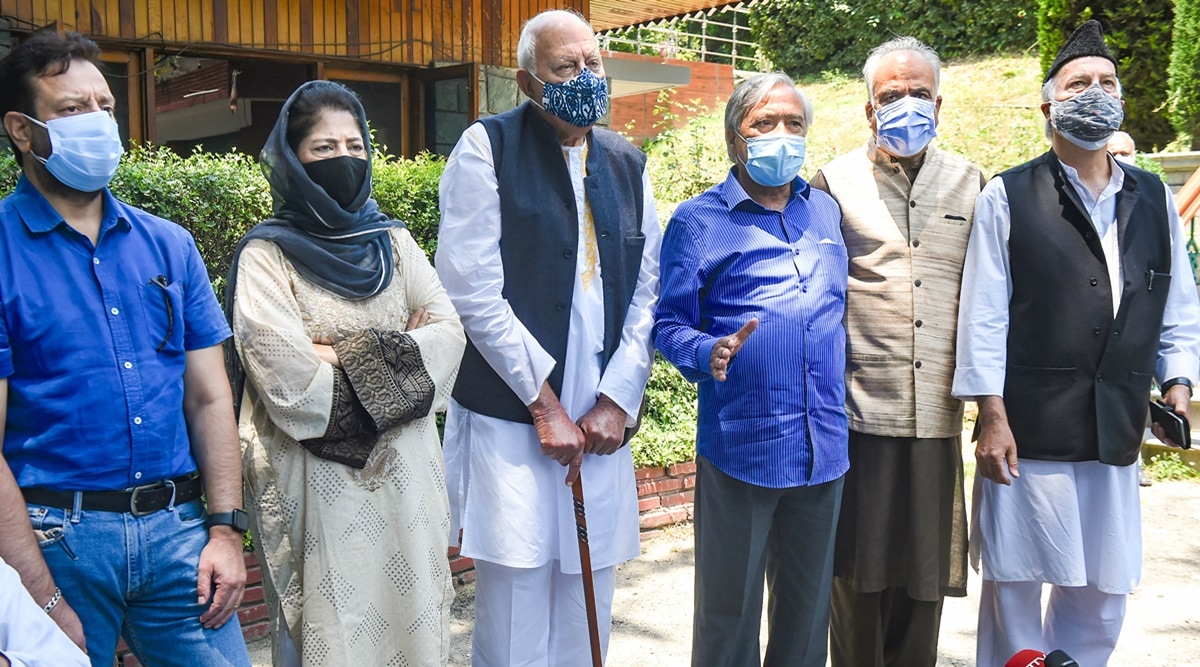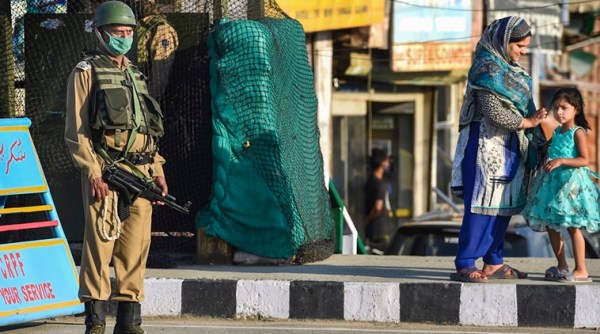 National Conference President Farooq Abdullah, PDP Chief Mehbooba Mufti and other members of the People’s Alliance for Gupkar Declaration address the media in Srinagar. (PTI)
National Conference President Farooq Abdullah, PDP Chief Mehbooba Mufti and other members of the People’s Alliance for Gupkar Declaration address the media in Srinagar. (PTI)Security forces in Jammu and Kashmir are on high alert as Prime Minister Narendra Modi will be meeting leaders of the People’s Alliance for Gupkar Declaration (PAGD), a coalition of mainstream parties in J&K, in New Delhi today.
The Centre sees the Delhi talks, the first since the stripping of the special status of J&K and its bifurcation into two Union Territories in 2019, as a crucial step towards the return of elected representatives and the holding of Assembly elections subsequently in the two UTs to end Central rule imposed in June 2018.
The government, official sources have indicated, is ready to discuss all issues that the J&K parties will bring to the table, but for now it is focused on getting the delimitation exercise completed and hold elections in J&K as soon as possible.
On Wednesday, the Delimitation Commission held a virtual meeting with the Deputy Commissioners of all J&K districts to discuss details of existing electoral constituencies. PM Modi plans to kick-start the political process leading to Assembly elections, the first step towards having an elected government in the Union Territory of J&K.
While Modi has reiterated that statehood is the inevitable destination of a political process, a possible roadmap towards that is also on the table for the meeting scheduled at 3 pm on June 24 in Delhi.
 A security personnel stands guard in Srinagar on Thursday. (PTI)
A security personnel stands guard in Srinagar on Thursday. (PTI)

The Union government’s invitation to 14 key political leaders from Jammu and Kashmir for a meeting with the Prime Minister in the national capital this week has led to speculation about possible scheduling of the Assembly elections. On Independence Day last year, Prime Minister Narendra Modi had said elections would be held in J&K after the delimitation process in the Union Territory was over. Delimitation is crucial for kick-starting the political process in J&K. Read more
Behind the unanimous decision by the People’s Alliance for Gupkar Declaration (PAGD) to attend the Prime Minister’s meeting Thursday is a sharp debate within. On how to read the Centre’s apparent “walk back” after the abrogation of J&K’s special status two years ago and its constant “denigration” of the coalition since then.
More than a “change of heart,” the refrain in Srinagar is that New Delhi’s move is shaped by political imperatives – from international to regional. (Read our Explainer)
Ahead of Prime Minister Narendra Modi’s meeting with leaders of all political parties from Jammu and Kashmir, a grouping of Leh-based socio-religious and political organisations, along with BJP MP Jamyang Tsering Namgyal, on Wednesday demanded a separate legislature for the Union Territory of Ladakh.
“We had so far been demanding safeguards under 6th Schedule of the Indian Constitution to address people’s apprehensions relating to land, reservation to jobs, culture, language and environment after abrogation of Articles 370 and 35-A,’’ said former Ladakh MP Thupstan Chhewang, a member of Apex Body, which comprises heads of most socio-religious and political organisations, during a press conference in Leh. “However, we have now changed our demand to a UT with legislature for Ladakh.” (Read Arun Sharma's report)
On the eve of the Prime Minister’s meeting with leaders of mainstream parties in Jammu & Kashmir, the Election Commission held a virtual-mode meeting Wednesday with Deputy Commissioners of all J&K districts to discuss details of existing electoral constituencies.
Sources in the J&K administration said Deputy Election Commissioner Chandra Bhushan Kumar’s meeting with the DCs was called to discuss “boundaries of the existing electoral constituencies, intersections of constituencies with other districts and tehsils”. (Read Naveed Iqbal and Arun Sharma’s report)